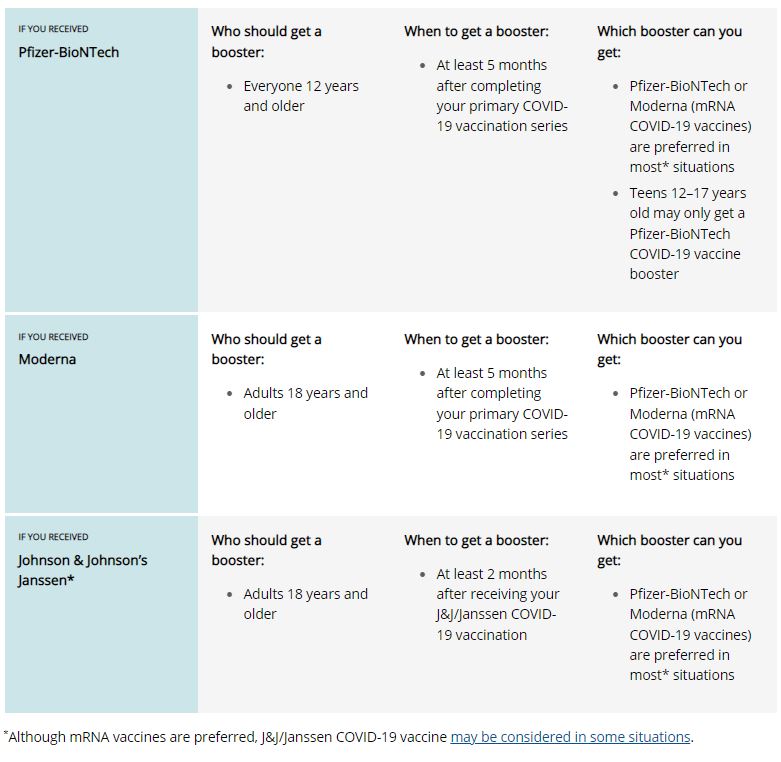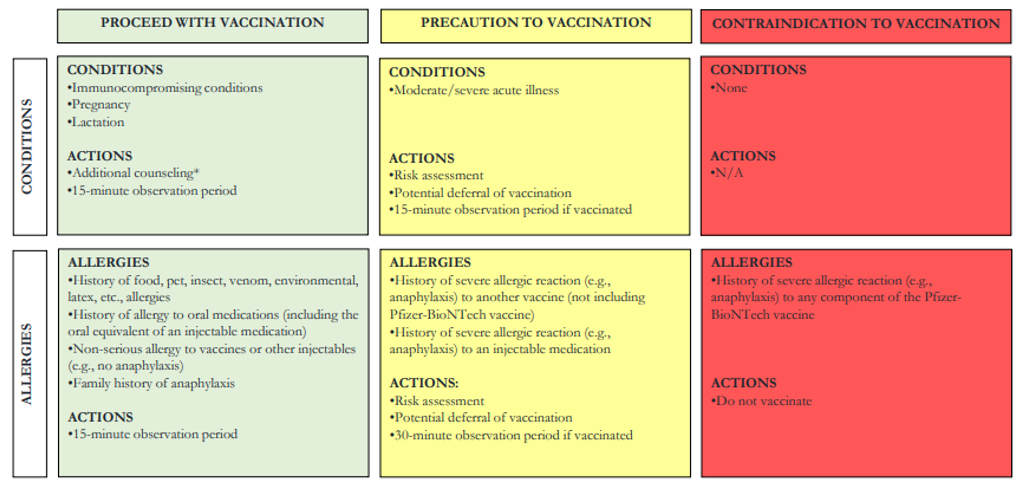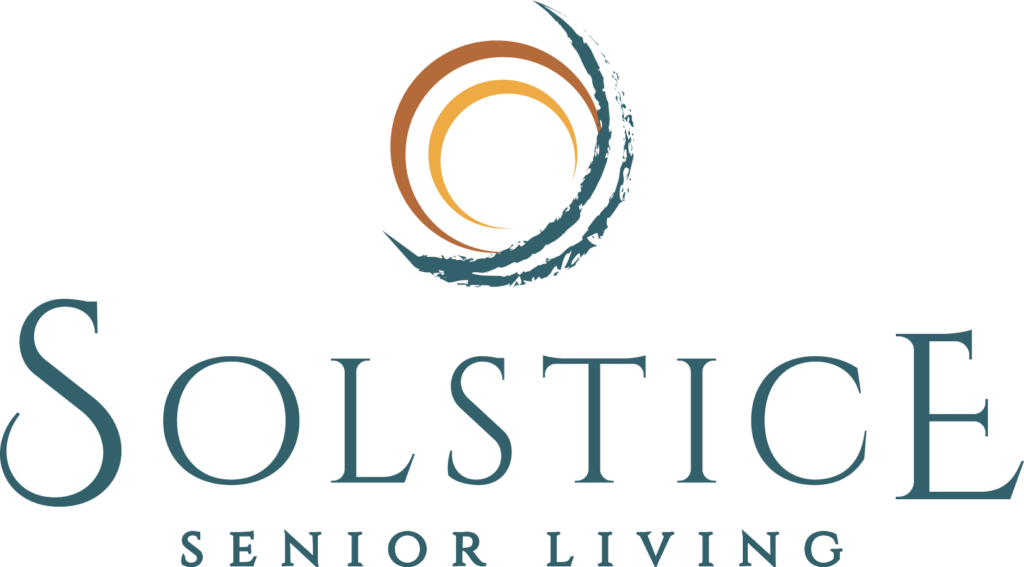Vaccine FAQs
Who is eligible to receive the COVID-19 vaccine?
- Everyone between the ages of 5 and 17 can receive the Pfizer-BioNTech (COMIRNATY) COVID-19 vaccine.
- Persons 18 and older have three vaccine options:
- Pfizer-BioNTech (COMIRNATY) COVID-19 vaccine
- Moderna COVID-19 vaccine
- Johnson & Johnson’s Janssen vaccine
Is the vaccine safe?
Both the Pfizer-BioNTech COVID-19 Vaccine and the Moderna COVID-19 vaccine have been authorized by the FDA. That meets that both vaccines met the high standards for safety, effectiveness, and manufacturing quality the FDA requires of an approved product.
The side effects, if any, have been mild. The Johnson & Johnson vaccine was briefly paused in order to investigate extremely rare cases of blood clotting in women under 50, but has since been resumed. You can read the CDC’s statement on this resumption on their website. If you have concerns, you should discuss them with your physician.
If you would like more information about the safety of the vaccine, please visit the CDC’s website page Ensuring the Safety of COVID-19 Vaccines in the United States.
Does the vaccine protect against the Delta variant?
Does the vaccine protect against the Omicron variant?
Should I get a booster vaccine?
Everyone age 12 or older is eligible to receive a booster shot. Although it is not mandatory, residents and associates are encouraged to receive a booster in accordance with FDA and CDC recommendations. For eligibility guidelines and timing recommendations, please refer to the graphic below from the CDC.
The FDA has also recently approved a second booster for adults age 50 and older. We encourage residents and associates to follow these recommendations.

Does it impact tuberculosis tests?
- i. If possible, perform the TB test before vaccination.
- ii. If already vaccinated or it is decided vaccination is the higher priority, defer skin or blood tests for TB for four weeks.
- iii. Consider alternatives as allowed by your state, such as symptom screening for TB and/or chest X-ray.
I have allergies. Should I receive the vaccine?
Review the chart below to see whether your condition(s) or allergies prevent you from receiving the vaccine.

Will I have to pay for the vaccine?
We have a contract with CVS Pharmacy to distribute and administer the vaccine to our residents and associates. We have been told there will be no cost for the vaccine; however, we anticipate our pharmacy partner will file the proper paperwork with residents’ health insurance providers to be reimbursed for administering the vaccine.
How many shots of the vaccine are needed?
How long do we wait between doses? What if I miss my second dose?
Is the vaccine mandatory for residents?
We strongly encourage all of our residents to get the vaccine. If a resident opts to not get the vaccine, he or she will likely have restrictions when it comes to community activities, outings, visitors and group dining.
What if I don’t want to get the vaccine?
We strongly encourage all residents to get the COVID-19 vaccine. The COVID-19 virus has been particularly hard on older populations and for those living in a communal setting. If you have any concerns about getting vaccinated, please let the executive director know or talk to your physician.
What if I / my staff / my resident previously had COVID-19/tested positive?
Will the vaccine cause a positive COVID-19 test result?
Will you require new residents to have the vaccine before they move in?
We are strongly recommending new residents get the COVID-19 vaccine before they move into the community. If they haven’t received the vaccine prior to moving in, they will be included in any vaccine clinics that take place at their community.
What if associates working in my community refuse to get vaccinated?
COVID-19 vaccines are strongly encouraged for our associates. Our associates serve many residents who fall into the CDC’s “critical populations” category, and we put the safety of our residents first. We expect and encourage all of our associates to receive the vaccine unless they have a valid medical reason or a religious belief that prohibits them from getting the vaccine.
If my family members get a vaccine, can they visit me in my residence?
Do I still have to wear a mask?
How long after getting the vaccine will we have to follow COVID protocols (masks, temperature and symptoms checks, and social distancing)?
We don’t have an answer to that question right now. We will seek guidance from our health care team and continue to follow any protocols in place on the federal, state and local levels.
How long does it take the vaccine to be effective?
You are considered fully vaccinated:
- Two weeks after the second dose in a two-dose series, such as the Pfizer or Moderna vaccines, or
- Two weeks after a single-dose vaccine, such as Johnson & Johnson’s Janssen vaccine.
If a resident or associate who has been vaccinated is exposed to someone with COVID, does he/she have to quarantine?
In accordance with with new guidelines released by the CDC, vaccinated persons who have been exposed to someone with COVID are not required to quarantine if they:
- Are within 3 months of their final vaccination date
- Are asymptomatic
Will the vaccine interfere with any of my daily medications?
If you have any concerns about the vaccine, please talk to your physician.
Where can I get the most up-to-date information on the vaccine?
The CDC website has a section dedicated to the COVID-19 vaccines: https://www.cdc.gov/coronavirus/2019-ncov/vaccines/index.html.
You can also visit our Vaccine page for more specific information about how ISL (SSL) is preparing to use the vaccine.
